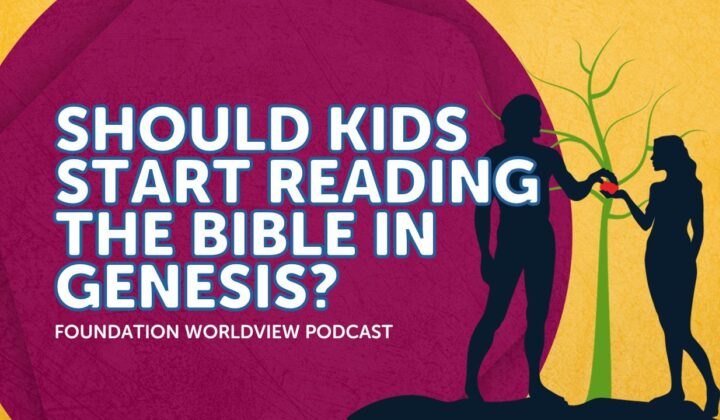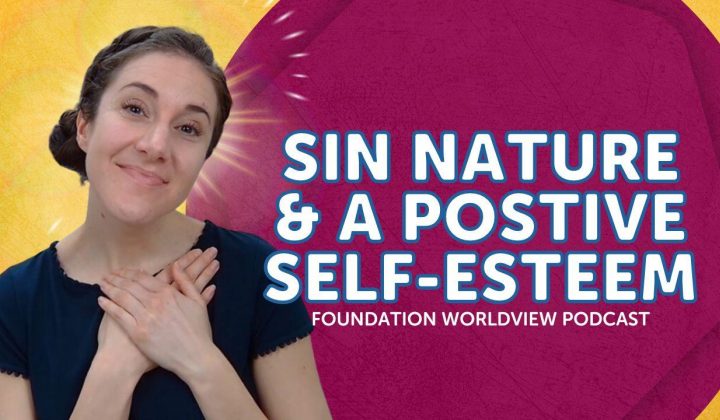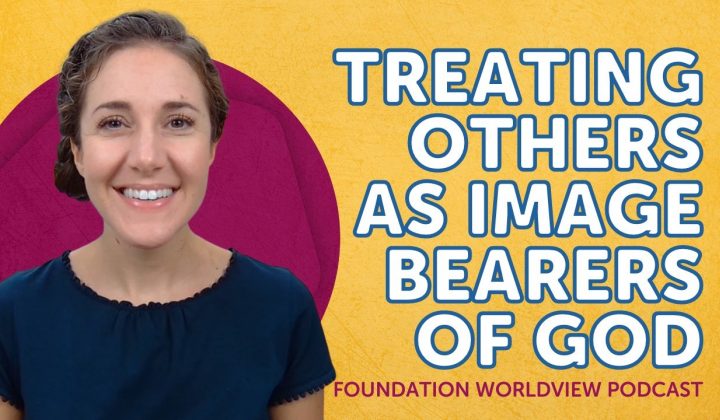Learn more about the journey that led to us equipping kids to carefully evaluate every idea they encounter.
Meet members of our team who have contributed to curriculum development.
Hear from real users of the Foundation Curriculum.
Learn what we believe about God, Jesus, Scripture, and more.
Helping Kids See Their Bodies the Way God Sees Them
How can we help our children view their bodies the way God sees them in a world with comparisons, fad diets, and body shaming?
Transcript
Note: The following is an auto-transcript of the podcast recording.
Hello friends, and welcome to another episode of Foundation Worldview Podcast where we seek to answer your questions so that you can equip the children that God has placed in your care to carefully evaluate every idea they encounter and understand the truth of the biblical worldview. I'm your host, Elizabeth Urbanowicz, and I'm thrilled that you've joined me for another episode today. Today's question says, "How can I help my children see their bodies size, shape, et cetera, the way God sees them in a world filled with comparisons, fad diets, and body shaming? If you have covered this already, please point me in the right direction." Great question. We're going to dive down deep into that today, and there is a place that you can go with more information for this. I did a webinar last year with Pastor Sam Allberry called 'Helping Kids Treasure their Bodies in a World that Devalues Them'. So highly recommend that you check out that webinar. It will go into much more detail about how we can help our kids think biblically about their bodies, but we'll still cover this question in brief today in the podcast.
Before we do that, if you have a question that you would like for me to answer on a future Foundation Worldview Podcast, you can submit that by going to FoundationWorldview.com/podcast. Also, just ask that you would invest a few seconds that it takes to write a review to rate this content, just to help more people discover it so we can equip even more children to understand the truth of the biblical worldview.
Now, as we think through, how can we help our children see their bodies as God sees them? I would say the first thing that we need to do, as in any aspect of life, is to lay the positive biblical theology of what God has to say about this topic.
So I'm going to walk us through several passages of Scripture that I think we need to walk through with our children to help them understand the goodness of their bodies. So the first thing that we need to take, or the first passage I think we need to take them to is the second chapter of Genesis verse seven, and in this verse, Moses wrote, "then the Lord God formed the man of the dust of the ground and breathed into his nostrils the breath of life, and the man became a living creature." So we can walk our kids through this verse and say, okay, what truths does this verse reveal about humans? This verse reveals that humans are both body and soul, that we are physical and metaphysical, that God created our body and our soul, and that both are inherently good because in the first chapter of Genesis, the overarching creation narrative, we hear repeatedly God say that it is good, and so that includes us as humans. Both body and soul are inherently good. However, we see now that even though there's this inherent goodness, there's also a corruption to this.
So that's where we can take our children to the next chapter. In Genesis, Genesis chapter three verses six and seven, and these verses say, "So when the woman saw that the tree was good for food, and that it was a delight to the eyes, and that the tree was to be desired to make one wise, she took of its fruit and ate, and she also gave some to her husband who was with her, and he ate. Then the eyes of both were opened, and they knew that they were naked. And they sewed fig leaves together and made themselves loincloths." We can then ask our children, okay, what truths are revealed in this passage about human sin? And then our bodies? This passage reveals that sin leads to an inherent sense of shame over our bodies. That what happened As soon as Adam and Eve ate of the tree, they realized they were naked and they hid from one another. Up until this point, they had been naked and they had been unashamed, but once they became sinful, there was this sense of shame over their bodies and they had to clothe themselves, hide themselves from one another.
Then the next passage I think we should take our kids to is again in Genesis chapter three, verses 16 through 19, these verses say "To the woman, God said, 'I will surely multiply your pain in childbearing; in pain you shall bring forth children. Your desire shall be contrary to your husband, but he shall rule over you.' And to Adam, he said, 'Because you have listened to the voice of your wife and have eaten of the tree of which I commanded you, 'You shall not eat of it,' cursed is the ground because of you; in pain you shall eat of it all the days of your life; thorns and thistles it shall bring forth for you; and you shall eat the plants of the field. By the sweat of your face, you shall eat bread till you return to the ground, for out of it you are taken; for you are dust, and to dust you shall return.'" And so then ask our children, okay, what truths about our bodies are revealed in this verse, sorry, not this verse, this passage. This passage reveals that the curse of sin affects our bodies in many ways.
We can go through and we can name them that for women childbearing will be very painful. Then for all humans, the ground is going to bring forth thorns and thistles and working that ground is going to be hard on our bodies, and then we are going to one day return to dust. Our bodies are going to die and decay. So the curse of sin affects our bodies in so many ways.
Then the next passage I think we should take our children to is John chapter one, verse 14, John one 14 says, "And the Word became flesh and dwelt among us, and we have seen His glory, glory as of the only Son from the Father, full of grace and truth." So what truth does this verse reveal about our bodies? This verse reveals that God, the son became flesh that he took on a human body. That means our bodies are not inherently evil, even while we live in this fallen earth, our bodies are inherently good. Yes, they have been corrupted by sin, but they are inherently good and a good gift from God, and we see that because God, the Son took on flesh.
Then the next passage we can take our children to is Luke chapter 24, verses 36 through 43. This passage reads, As they were talking about these things, Jesus himself stood among them, and said to them, "Peace to you!" But they were startled and frightened and thought they saw a spirit. And he said to them, "Why are you troubled and why do doubts arise in your hearts? See my hands and my feet, that it is I myself. Touch me, and see. For a spirit does not have flesh and bones as you see that I have." And when he had said this, he showed them his hands and his feet. And while they still disbelieved for joy and were marveling, he said to them, "Have you anything to eat?" They gave him a piece of broiled fish, and he took it and eat it before them." In this passage, what truth does this passage reveal about our bodies? It reveals that Jesus resurrected bodily, that Jesus' body was not inherently evil. It was inherently good, and he resurrected bodily. And that means that we too will one day resurrect bodily that our bodies are of great value and that we will have our bodies, we will be our bodies, we will be this intimate intertwining of body and soul for all eternity.
And then the final passage that I would take our children to is in Romans chapter eight, verses 22 to 23, which says, "For we know that the whole creation has been groaning together in the pains of childbirth until now. And not only the creation, but we ourselves, who have the firstfruits of the Spirit, groan inwardly as we wait eagerly for adoption as sons, the redemption of our bodies." This passage reveals that, yes, right now we are groaning as is all of the creation, waiting for our full redemption, our adoption as sons, which involves the redemption of our bodies. So our bodies along with our souls will be fully redeemed.
So we want to make sure that we walk our kids just through this biblical narrative that we're created body and soul, which are inherently good, but sin led to corruption. It led to shame over our bodies, and then we see that the curse of sin affects our bodies in so many ways, but then we see that God, the son, became flesh and he resurrected bodily, and we too will one day resurrect bodily when our bodies are fully redeemed. So we want to walk our kids through these biblical truths.
Then just in everyday conversation, we want to use language that reflects the biblical worldview. So we want to talk about the inherent goodness of our bodies when your child is at soccer practice, wow, isn't it amazing that God has given you legs that carry you and that run and that feet that can kick the ball and lungs, that can breathe in air, and a heart that can pump blood and that oxygen to your lungs?Isn't that incredible how God created your body? Okay, when your children are doing things with their hands, isn't it amazing these five fingers God has given you on each of your hands and how they can all work together to help you play the violin or to help you type on the keyboard or to help you write or to draw? Just talk about the inherent goodness of our bodies. And we can do this even in areas of weakness or self-consciousness.
For example, I know that one of the members of my immediate family really does not like their feet, that if you look at this family member's feet, they're not awful. But if you look at a foot model, this family member's feet would not look like a foot model, but I know that this family member reminds themselves whenever they're self-conscious, wearing sandals, just that my feet are inherently good. They're helping me walk. They're keeping me up because of these feet I can run.
And so just to think through anytime our children are feeling self-conscious about their bodies, just to make sure that we're using language to remind them of the inherent goodness of their bodies, and then we can have conversations with them about why is it that we might feel shame over this part of our body, or why might we try to think we have to compare ourselves to someone else or feel like we don't measure up? That's because of the effects of the fall, and so we need to remember the inherent goodness of our bodies and the fact that our bodies are so valuable that God will one day fully redeem our bodies, that they will be resurrected in the New Heaven and the New Earth. Then when our children are sick, or there's other effects of the fall, maybe a child has some sort of disability, a physical disability, and talk about how this is an effect of the fall, that sickness or the disabilities that we have, they're not the direct result of choices that we make, but they are the results of our inherent sin in Adam, and we can trust that one day when Jesus returns that we will be fully redeemed with resurrected bodies and that we will no longer be suffering from the curse of sin and death.
So we just want to, again, walk our kids through this biblical truth of what our bodies are, their inherent goodness, the future of our bodies, and then make sure that we're using this language. Are our children going to struggle at times with self-consciousness or shame over their bodies? Yes, they are, because we all do. That's one of the lies of our culture, that if we somehow make sure that there's never any body shaming, there's never any judgment or things like that, that somehow our children will have a good view of themselves. You know what? Even if we locked our children in a room which we should not do and only fed them positive messages about themselves, they would still struggle with some self-consciousness or some shame over their bodies because of sin. Okay? When Adam and Eve fell, no one came and told them that there was something wrong with them because of their sin. They just knew that there was now shame over their bodies. So there's nothing that we can do to completely erase any shame or all shame from our children because we live in this sinful, fallen world. But what we can do is point them to the biblical truth about their bodies and then consistently use that language when we're talking with them about their bodies.
Again, as I mentioned at the beginning of this podcast, if you want a more thorough treatment on this subject, highly recommend that you check out the webinar that I did last year with Sam Allberry called 'Helping Our Children Treasure Their Bodies in a World that Devalues Them'. Also, please make sure that you stay tuned for our next upcoming curriculum, our 'God's Good Design Curriculum', because in that curriculum for kids four on up, we will be talking about these exact truths about the inherent goodness of their bodies.
Well, that's a wrap for today's episode, but as always, my prayer for you as we leave this time together is that no matter the situation in which you and the children God has placed in your care, find yourselves that you would trust that God is working all things together for your good. By using all things to conform you more into the image of His Son. I'll see you next time.
Related Posts and insights

Should Kids Start Reading the Bible in Genesis?
In this episode, Elizabeth Urbanowicz discusses the best starting point for kids reading the Bible. She explores how age, prior exposure to scripture, and reading dynamics factor into this important decision. Listen in for practical tips on fostering a meaningful engagement with the Bible for the young ones in your care.

Talking To Kids About Their Sin Nature without Damaging Their Self-Esteem
In this episode of the Foundation Worldview podcast, host Elizabeth Urbanowicz answers a question that many Christian parents may have: how do we teach young children about their value and worth to God while also discussing the concept of sin?

How to Teach Children to Treat Others As Image Bearers of God?
No matter what age, kids are bound to have questions about violence in the Bible. As a parent, it's important to be prepared to answer these questions in a way that is both honest and intentional. In this podcast, Elizabeth Urbanowicz will talk about how to address and talk to kids about violence in the scripture in a way that is developmentally appropriate and sensitive to their unique needs.





